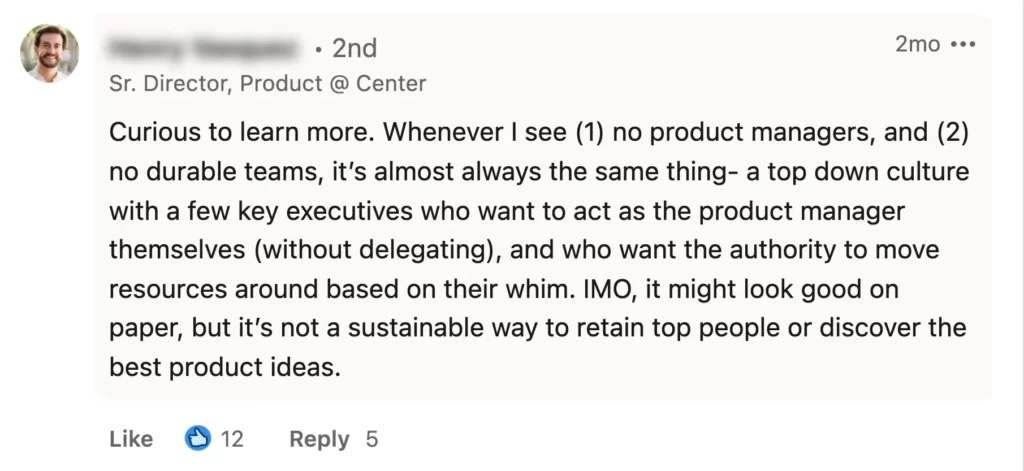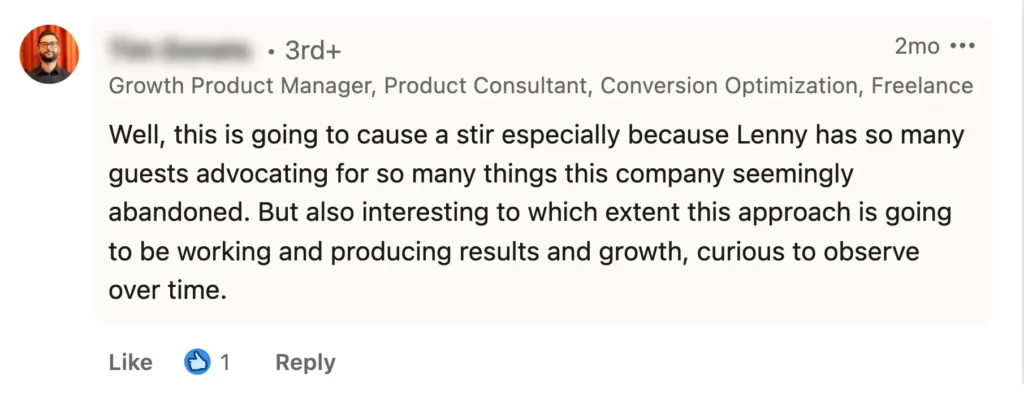When to Hire Your First Product Manager: Lessons from Linear’s Innovative Approach
In an industry ripe for innovation, Linear stands out as a formidable contender against Jira with its sleek design and intuitive interface. The company recently garnered online buzz through an interview with Lenny Rachitsky, where Karri Saarinen, Linear’s CEO, unfolded the philosophy behind their product-centric culture and seeming reluctance to add product managers to the team. This piqued the interest (and backlash) from many, with Lenny’s Newsletter subscribers expressing a keen desire to delve deeper into Linear’s product methodologies.
Linear’s trajectory has been impressive. Their customer base boasts notable names like Retool, Vercel, and Substack. Remarkably, within just two years of product launch, Linear has been operating at a profit. Their financial prudence is evident in their negative lifetime burn rate, which indicates they have more cash in the bank than the total amount raised from investors. Marketing expenses? A mere $35,000 on paid efforts. Employee retention? Stellar, with only two departures from a robust team of 50. Shedding light on Linear’s unique success, their Head of Product (and sole product manager) Nan Yu joined Menlo Ventures for a recent discussion.
Surprise and Backlash: Linear’s Lone Product Manager
For many, hearing it was a shock: Linear operates with just a single product manager (PM)—Nan. Amidst the buzz, reactions on platforms like LinkedIn ranged from astonishment to skepticism. After Lenny posted this on his LinkedIn, it piqued the interest of many in the industry, who took note of Linear’s unique approach.
Sample of responses
This unconventional strategy has provoked a most admirable reaction. Enthusiasts praise Linear for their lean approach, arguing it fosters a deep product understanding across the team. Yet, the question arises: When should a startup hire its first PM? Linear’s journey offers a masterclass in timing and strategic growth. Karri’s insights during his talk with Lenny provided a unique perspective, emphasizing that product management is a collective responsibility rather than a single role.
Understanding the Role of a PM in a Startup and Linear’s Criteria for PM Excellence
Before we discuss hiring, let’s define what a PM does in a startup environment. A PM at this stage is a conductor, orchestrating between various teams to ensure the product not only meets the market need but is delivered efficiently and effectively. They are a bridge between the technical and non-technical worlds, translating customer pain points into actionable engineering specs.
Karri’s stance on PM hiring aims for a more integrated approach. He suggests that startups should foster an environment where everyone is as knowledgeable about the product as their best users. Nan noted that this approach mirrors the philosophy at non-tech companies like Yamaha, where PMs are expected to be experts at using their product, exemplified by PMs who are also concert-level pianists—especially in the context of mature product markets. He mentioned this analogy was especially salient given Linear is taking on a huge incumbent, and there’s a lot of prior art to understand before making any improvements!
Timing the PM Hire
Linear waited until they reached a certain maturity before bringing on a PM. This was intentional to ensure that the product’s early development was driven by those closest to it—the engineers and early adopters. For startups considering their first PM hire, Nan outlined Linear’s approach:
Scaling: When the product and team reach a complexity that requires dedicated oversight.
Customer feedback loop: As customer feedback becomes more voluminous and nuanced.
Strategic direction: The need for a strategic vision that aligns with the business goals.
No durable teams: Fixed teams can create artificial barriers at an early stage; roles and responsibilities should be fluid.
No OKRs: Unnecessary in a startup’s early days. Direct communication > metrics-driven motivations.
Remote-first: The hiring policy is not constrained by geographical borders.
As startups like Linear evolve, the timing of the first PM hire should be a calculated decision—one that aligns with the company’s stage, culture, and specific needs. Linear’s example teaches us that there’s no one-size-fits-all answer; each startup must evaluate its own trajectory and team dynamics.
Deciding when to hire a product manager is a critical decision that can significantly influence the trajectory of a startup’s growth. The PM role is multifaceted, impacting product strategy, execution, and the translation of technical capabilities into customer satisfaction and revenue. However, determining the right time to bring a PM on board requires a nuanced understanding of your company’s stage, market dynamics, and internal capabilities.
A common misconception is that a PM should be hired early in the startup phase, particularly when the company hits a certain revenue threshold. This period often coincides with increasing business complexities and a growing feeling of being perpetually busy, which might suggest the need for a PM. However, at this stage, the core focus should be on achieving product-market fit, and often, the people best equipped to guide this process are the founders themselves, who bring passion and vision for the product’s direction.
Early-stage products typically do not have the complexity in workflows or customer demands that justify a full-time PM role. The temptation to hire a PM to alleviate operational pressures can lead to underutilization of talent, as PMs may end up focusing on non-critical tasks. Moreover, hiring a PM too early may even hinder agility, as additional layers within the product development process can slow down a startup’s ability to iterate rapidly.
The right time to hire a PM is when there is a real product for them to own. This often coincides with having a strong product-market fit, multiple customer use cases, or distinct product lines that need strategic guidance and focused execution. In such cases, a PM can help divide the company’s strategic function and effectively target diverse customer needs. Hiring a PM becomes especially relevant in sectors where products are complex and sector-specific knowledge is crucial for the product’s success.
Of course, there are always exceptions: If the opportunity arises to hire a highly talented PM who brings a wealth of experience, connections, or deep industry knowledge, it may be advantageous to bring them on board earlier. This exceptional talent can potentially reshape the company’s product strategy and execution. Before Linear, Nan was the CTO of Everlane (from the very early days), ran all of EPD at Mode, and was an engineering leader at Abstract. His specialty is running entire EPD orgs while scaling companies from zero to one and beyond.
Instead of rushing to hire a PM, startups should consider other roles that may be more critical at early stages. A founding designer can enhance product design and user experience—a vital element in today’s market, where design expectations are constantly rising. A strong engineering manager can streamline development processes, ensuring the team builds the right product efficiently. Lastly, a demand generation expert can improve market fit by ensuring the product reaches and resonates with the ideal customer base.
Ultimately, Linear’s story is a testament to the idea that great products are built by teams that prioritize understanding and versatility over traditional structures. For startups pondering their first PM hire, consider Linear’s journey as a blueprint. It’s not about when to hire a PM, but about when your team is ready.








